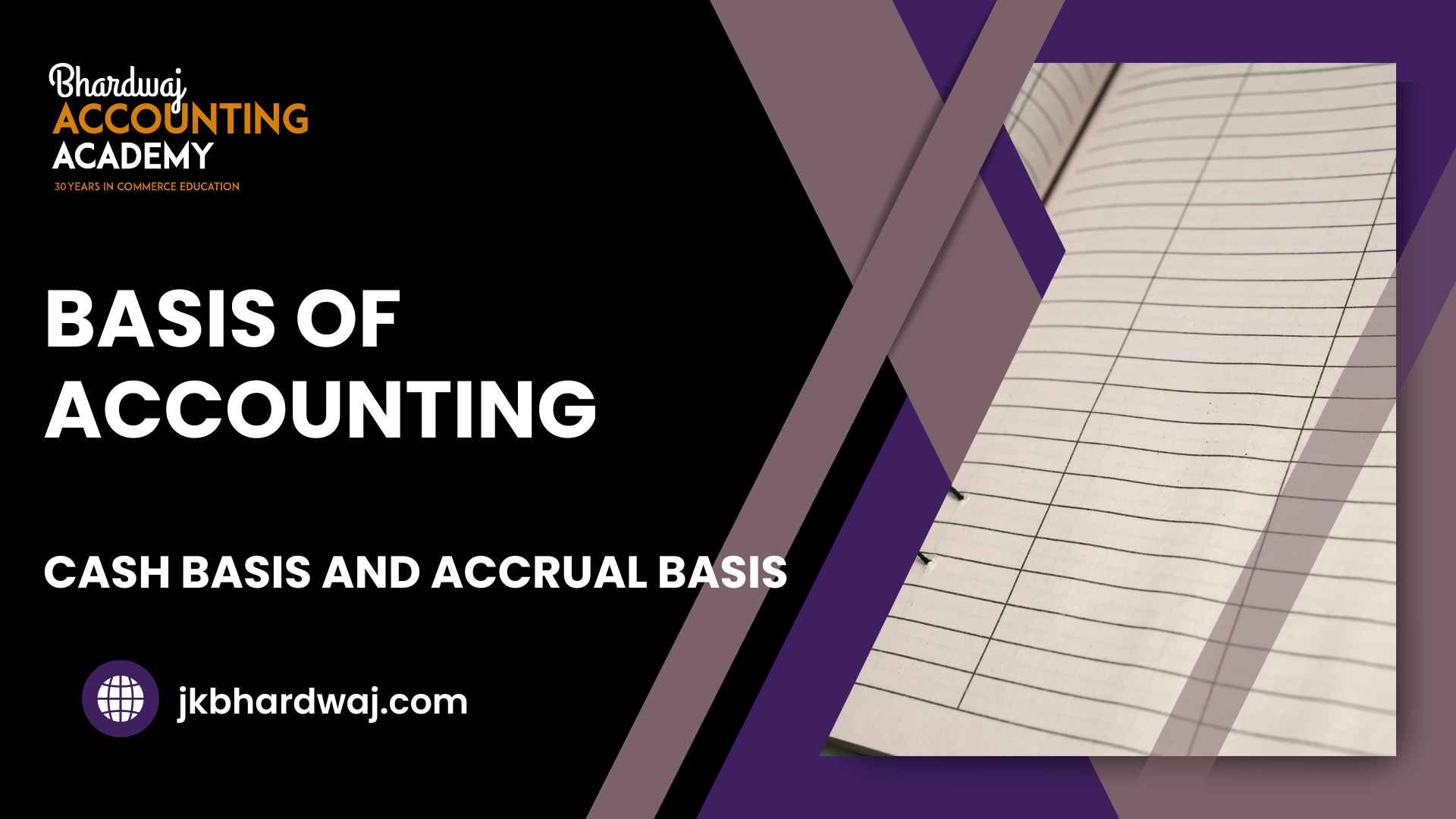Table of Contents
Basis of Accounting: Cash and Accrual
In Accounting, the period is a crucial aspect. Deciding when the income and expenditure should be recorded is also important. Basis of Accounting states when the transactions are to be recorded.
Cash Basis: In this system, you record the income when it is received and the expenses are recorded when they are paid.
Accrual basis: In this system, the incomes are recorded when they are earned and expenses are recorded when they are incurred even if the the incomes are not yet received or expenses are not yet paid, they are recorded.
INTRODUCTION
The main objective of accounting is to determine profit earned or loss incurred by a business at the end of each accounting period. There are two bases for ascertaining profit or loss:
- Cash Basis of Accounting
- Accrual or Mercantile Basis of Accounting.
CASH BASIS OF ACCOUNTING
Cash Basis of accounting is a system in which transactions are recorded when cash is received or paid.
- Revenues are recorded when cash is received. For example, goods sold on credit will be recorded only when sale proceeds are received. Similarly, expenses are recorded when cash is paid for them. For example, if the salary for the month of December is paid in January, then it will be recorded in January.
- So, under the Cash Basis of Accounting, only cash transactions are recorded and credit transactions are ignored till the cash is received/paid for such credit transactions.
- Profit or loss for an accounting period is calculated as the difference between the actual cash receipts in respect of the sale of goods or services and other incomes over actual payments in respect of total expenses.
- Outstanding expenses, prepaid expenses, and income accrued are not considered under the Cash Basis of Accounting. Generally, this system of accounting is adopted by non-trading concerns like schools, college, clubs, etc.
Also Read: 20 transactions with their Journal Entries, Ledger and Trial balance to prepare project
Advantages of Cash Basis
The main advantages are:
- It is a simple method to understand and follow because there are no adjustment entries for outstanding expenses, prepaid expenses, accrued income, and unearned income.
- This approach is more objective as it avoids the use of estimates and personal judgment.
- It is suitable for those enterprises where most of the transactions are on a cash basis. Accounting
Disadvantages of Cash Basis of Accounting
The main disadvantages are:
- It does not present a true and fair view of profit or loss and the financial position of an enterprise as it ignores adjusting entries of outstanding expenses, prepaid expenses, accrued income, and unearned income.
- It does not follow the matching principle of accounting.
- There is no consistency in the profits of different years as capital and revenue items are not distinguished.
ACCRUAL BASIS OF ACCOUNTING
According to the Accrual Basis of Accounting, revenue and expenses are recorded in the period in which they become due, rather than when they are received or paid.
- Under this system of accounting, a transaction is recorded in the books when it is entered into and not when the settlement takes place. It means:
- Revenue is recorded when sales are made or services are rendered, irrespective of the fact whether cash is received or not. So, if a firm has sold goods on 27th June 2016 on 2 months credit, then the sale must be recorded on 27th June 2016, although the amount will be received in August.
- Similarly, expenses are recorded in the period in which they have become due rather than in the period in which they are paid.
- The profit or loss of any accounting period is the difference between the incomes earned and expenses incurred, irrespective of cash payment or receipt. So, this method is compatible with the matching principle of accounting.
- Outstanding expenses, prepaid expenses, accrued income, and unearned income are adjusted while preparing the Financial Statements. According to the Companies Act, 2013, companies are required to follow the accrual basis of accounting in maintaining the books of accounts.
Advantages of Accrual Basis of Accounting
The main advantages are:
- It is a more scientific system of accounting and is preferred and followed all over the world by accountants.
- It follows the matching principle of accounting.
- It discloses correct profit or loss for a particular period and also depicts the true financial position of the business as it takes into account all business transactions and also considers all adjustments like outstanding expenses, prepaid expenses, accrued income, and unearned income.
- There is consistency in the profits of different years as capital and revenue items are distinguished.
Disadvantages of Accrual Basis of Accounting
The main disadvantages are
- It is not as simple as the Cash Basis of Accounting.
- It requires the use of estimates and personal judgments.
- The accounting process is too elaborate as it requires a number of adjustments to be made regarding outstanding expenses, prepaid expenses, accrued income, and unearned income.

